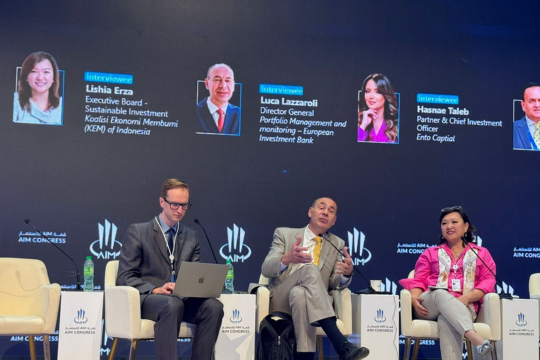Indonesia Ready to Implement Restorative Economics
Jakarta, October 10, 2024. Since independence, Indonesia has strived to build a robust economy through various approaches, from foundational socialist principles to opening up significantly to foreign investment. However, no economic system has yet achieved equitable prosperity across the nation.
According to Bhima Yudistira, Executive Director of the Center of Economic and Law Studies (CELIOS), it is time for Indonesia to establish its own economic strength, independent of mainstream models.
Indonesia’s economic model, resilient through crises like the 1998 monetary crisis and the COVID-19 pandemic, is one built on the backbone of local communities and small to medium-sized enterprises (SMEs). Yudistira explains that this is an economic approach that not only distributes wealth but also promotes environmental restoration by avoiding large-scale extractive practices such as mining and extensive monoculture plantations.
A restorative economic system, Yudistira states, brings balance between economic development and environmental sustainability. CELIOS defines restorative economics as a model aimed at rehabilitating degraded ecosystems to regain their ecological function and deliver valuable goods and services to the community.
“If the government fails to recognize this uniquely Indonesian and proven economic model, it’s our loss,” Yudistira emphasized during a discussion titled Economics in the Climate Crisis Era and the soft launch of the book Saatnya Ekonomi Restoratif (The Time for Restorative Economics) in Jakarta on Thursday, October 10, 2024.
This discussion was a collaboration between CELIOS, the LaporIklim platform, KBR radio network, various independent writers, and supporting organizations including EcoNusa, Lingkar Temu Kabupaten Lestari, Koalisi Ekonomi Membumi, Traction Energi Asia, Iklimku.org, and Yayasan Bambu Lestari.
Yudistira questioned the view that extractive economics provides a solution. CELIOS research indicates that villages with an extractive income base, such as mining, often struggle with access to healthcare and education.
Moreover, dependency on commodities like nickel and coal, whose prices are volatile and often declining, leaves Indonesia’s economy vulnerable to external influences. Yudistira stressed that extractive economies are not only destructive but also detrimental to public health and the environment.
Economic analyst Harryadin Mahardika highlighted the economic model dilemma Indonesia faces. The country seeks industrialization but lags behind the efficiency of countries like China, India, and Vietnam. As a result, Indonesia has turned to resource extraction and downstream processing in what he calls a pragmatic yet realistic strategy by President Joko Widodo’s administration.
Mahardika pointed out that current economic policies have yet to produce a “trickle-down” effect to evenly distribute wealth to the people as intended.
Ully Artha Siagiani, Forest and Plantation Campaign Manager at WALHI, emphasized the importance of balancing people, economy, and environment. For Indonesia to develop a restorative and sustainable “nusantara economy,” she underscored the need to question today’s prevailing extractive and capitalistic economic models. WALHI’s 2019-2020 research shows that communities in well-preserved environments, such as peatlands, highlands, and coastal areas, maintain economic resilience.
Ristika Putri Istanti, Coordinator of the Lingkar Temu Kabupaten Lestari Secretariat, discussed the county-level transformation efforts that began in 2017, with several regions voluntarily advancing toward a more sustainable economy. Massive forest fires in 2019 and severe flooding in Kalimantan in 2021 have been pivotal in driving policy changes at the county level. However, significant challenges remain due to Indonesia’s vast and diverse conditions.
Ristika advocates for limiting resource extraction and monoculture plantations. She calls for responsible management and the development of diverse commodities.
Ristika added that restorative economics is not only about restoring forests but also about restructuring an economic model that has yet to achieve equity. She also suggested the establishment of clear thresholds regarding when to open, expand, or halt economic activities.
Purwanto Setiadi, lead author of the book Saatnya Ekonomi Restoratif, explained that the book compiles the pioneering restorative economic practices that have taken root across the archipelago in response to unjust practices and ecological disaster threats. He hopes this book enriches the narrative on transformative and restorative models for Indonesia’s economic development.
The book Saatnya Ekonomi Restoratif is available for download on the CELIOS and Lapor Iklim platforms.
For more information, please contact:
Saleh (CELIOS)
+62821 3329 0067

